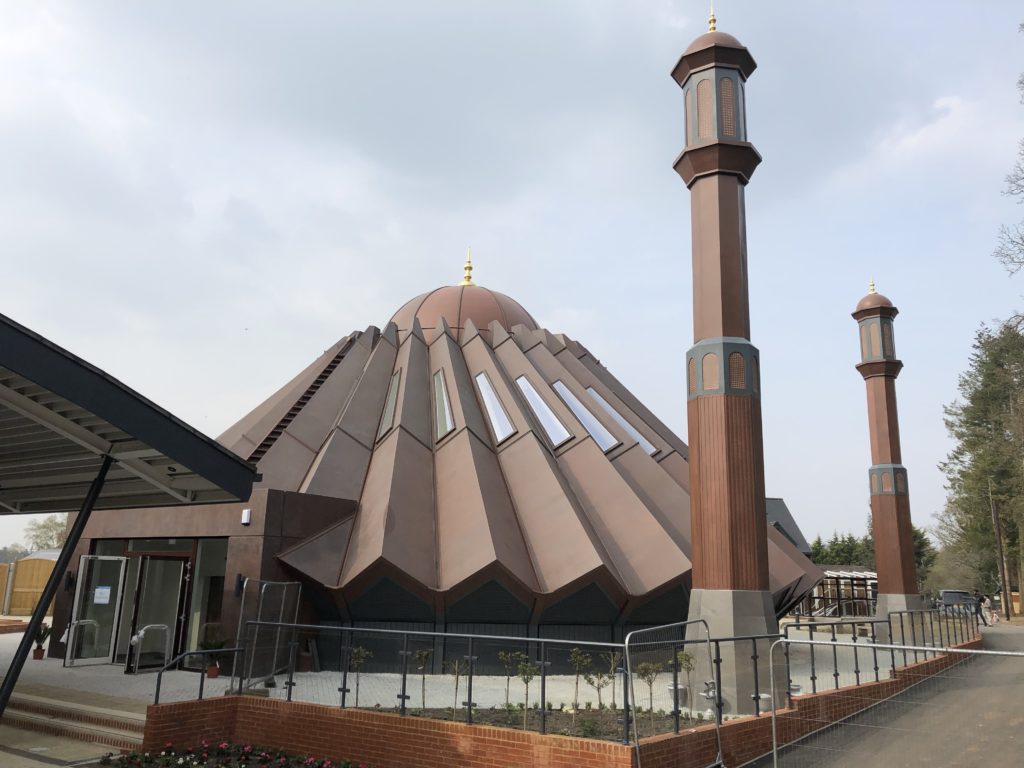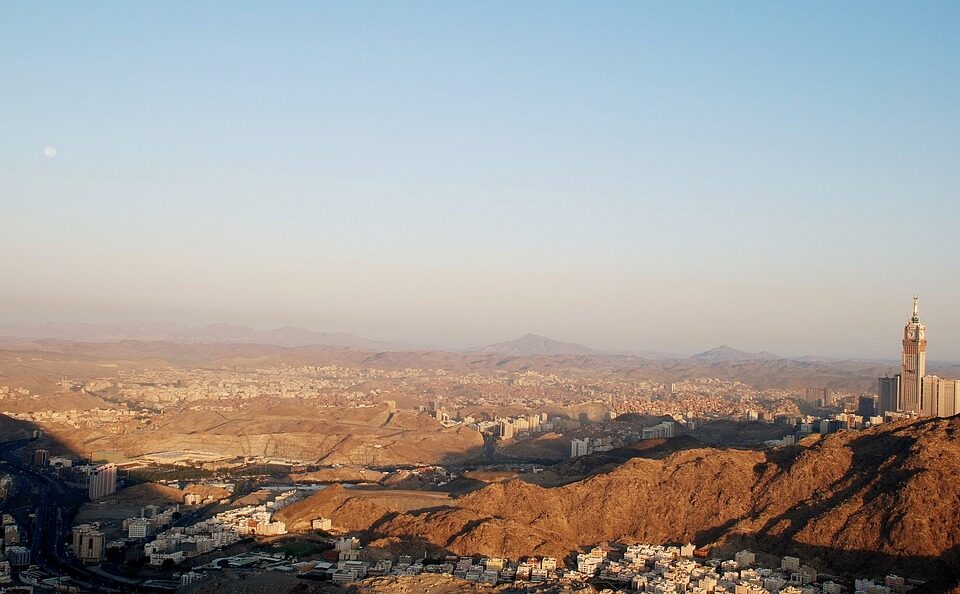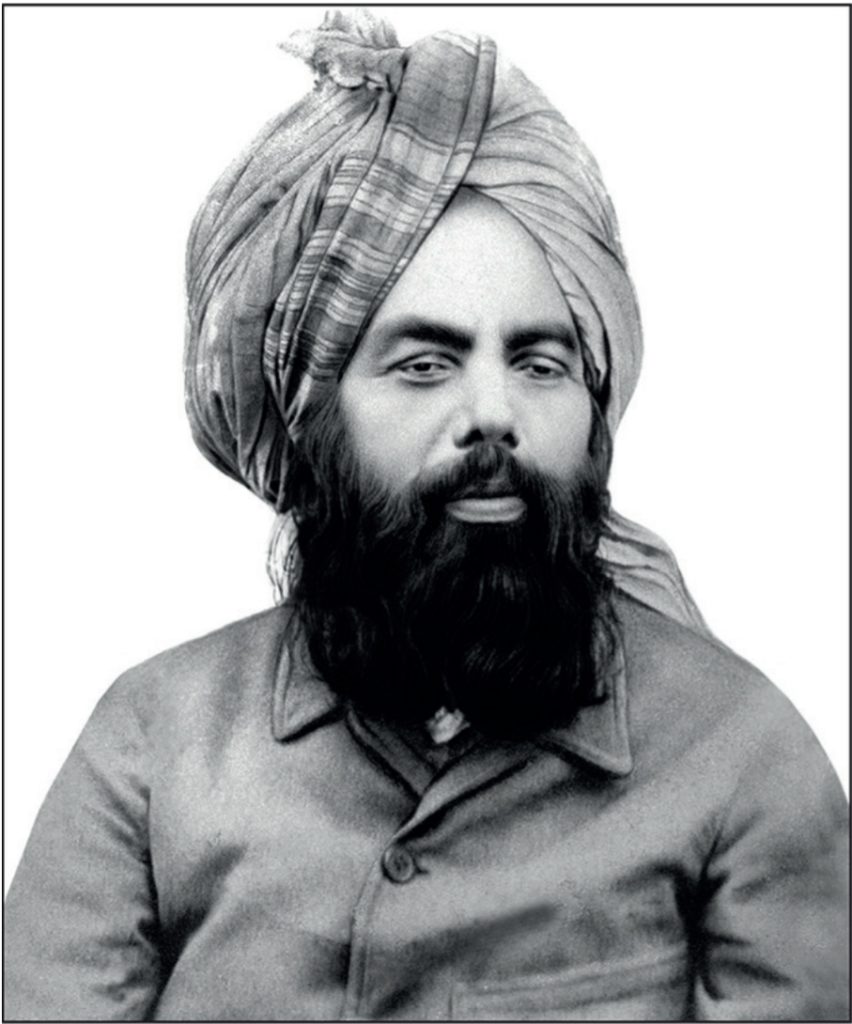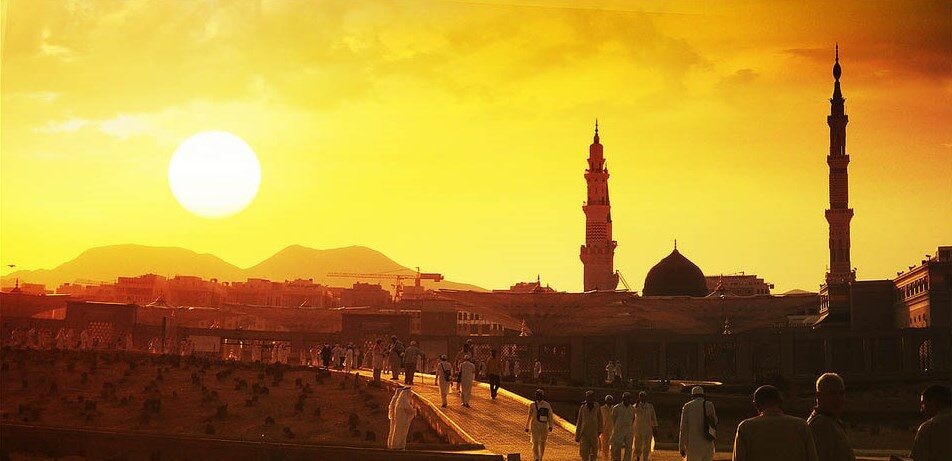Wednesday, 21 July 2021, Islamabad, UK: Hazrat Amirul Momineen, Khalifatul Masih Vaa arrived at the Mubarak Mosque in Islamabad, UK at 10:33 BST to lead the congregation in the Eid-ul-Adha prayer.

Following the Eid Salat, Hazrat Amirul Momineen, may Allah strengthen his hand, addressed the congregation and the millions of viewers of MTA International with his Eid-ul-Adha sermon.
After tashahud, ta‘awuz and Surah al-Fatihah, Hazrat Amirul Momineenaa recited the following verse of the Holy Quran and proceeded with the Eid-ul-Adha sermon.
لَنۡ یَّنَالَ اللّٰہَ لُحُوۡمُہَا وَ لَا دِمَآؤُہَا وَ لٰکِنۡ یَّنَالُہُ التَّقۡوٰی مِنۡکُمۡ ؕ کَذٰلِکَ سَخَّرَہَا لَکُمۡ لِتُکَبِّرُوا اللّٰہَ عَلٰی مَا ہَدٰٮکُمۡ ؕ وَ بَشِّرِ الۡمُحۡسِنِیۡنَ
“Their flesh reaches not Allah, nor does their blood, but it is your righteousness that reaches Him. Thus has He subjected them to you, that you may glorify Allah for His guiding you. And give glad tidings to those who do good.” (Surah al-Hajj, Ch.22: V.38)
Huzooraa then said that on this Eid, various animals were slaughtered in the way of Allah, and during the Hajj, hundreds of thousands of animals were slaughtered. Although for the last couple of years, Hajj had been impacted due to the situation of the world, but in normal circumstances, many animals were sacrificed and widely distributed among the poor and needy.

In general, Huzooraa said, in the Muslim world, animals were slaughtered in large numbers. Some did this for mere show and to display their wealth and reach.
In Pakistan, people take great pride in the fact that they prevent Ahmadis from celebrating Eid. They see themselves as the custodians of faith and thus consider that no Ahmadi can sacrifice any animals on this day. The surprising thing is that law enforcement supports such hindrances. Some allow sacrifice by Ahmadis to be done in secret, but otherwise, if news gets out about Ahmadis slaughtering animals, then there is great opposition to it.
The enforcers seem to be compelled to stay quiet against this injustice. Regardless, this has always been the way of opponents of the Ahmadiyya Jamaat, that they try and make any excuse to bring grief and trouble to Ahmadis.
The reason behind all this is that they do not possess taqwa and believe that they are practicing Islam in its fullest. Only Allah knows who possesses true taqwa, who is right in His sight and who is in the wrong. We, Ahmadi Muslims, prostrate and bow before God alone. If we continue to do this, then certainly, God’s help and succour will be with us.
In the verse Huzooraa recited at the outset (Ch.22: V.38), Allah says that He is not in need of any sacrificial animal or meat. Thus, if Ahmadis are prohibited from sacrificing animals, then they should not worry; if we continue to tread the path of taqwa and have the intention to sacrifice animals, then we will reap the blessings associated with it irrespective of any attempts to hinder us from its blessings.
We are fortunate, as Ahmadi Muslims, that we have accepted the Imam of the age, the Promised Messiah, Hazrat Mirza Ghulam Ahmad, peace be upon him. He taught us the true teachings of the Holy Quran. We should not be upset that we have been prohibited from sacrificing animals; rather, we should ensure that our pure intentions are accepted by God.

We find in narrations and traditions that one person gained the reward for Hajj without doing Hajj and by bearing the expenses of another person’s Hajj. Thus, apparent show of rituals is not always a guarantor of divine reward.
If we are not making sacrifices solely for the sake of Allah, then it is of no benefit.
In the Holy Quran, Allah speaks of sacrifice in various places. The Promised Messiahas has also elucidated this subject.
At one place, Hazrat Mirza Ghulam Ahmadas said, “Man should, with all his faculties and potential, sacrifice himself for the sake of God.” He said that the actual purpose of sacrifice is what has been mentioned in the verse:
لَنۡ یَّنَالَ اللّٰہَ لُحُوۡمُہَا وَ لَا دِمَآؤُہَا وَ لٰکِنۡ یَّنَالُہُ التَّقۡوٰی مِنۡکُمۡ ؕ کَذٰلِکَ سَخَّرَہَا لَکُمۡ لِتُکَبِّرُوا اللّٰہَ عَلٰی مَا ہَدٰٮکُمۡ ؕ وَ بَشِّرِ الۡمُحۡسِنِیۡنَ
“Their flesh reaches not Allah, nor does their blood, but it is your righteousness that reaches Him. Thus has He subjected them to you, that you may glorify Allah for His guiding you. And give glad tidings to those who do good.” (Surah al-Hajj, Ch.22: V.38)
Thus, the Promised Messiahas said, we should sacrifice our own selves whilst attaining taqwa.
Hazrat Ahmadas also said that without true sincerity and pious intentions, Salat and prayers are of no benefit. Many other religions pray with great efforts and by putting themselves in great trouble and difficulty, but these practices alone cannot bring them spiritual enlightenment.
Bearing in mind this verse (Ch.22: V.38), Allah is not in need of our efforts; rather, He desires the essence in our sacrifices and practices.
Hazrat Ahmadas then posed a question that if God required taqwa from us, what need was there for physical acts like slaughtering animals and sacrifice.
Hazrat Ahmadas answered this question by saying that those who did not practice taqwa with their physical bodies, could not succeed spiritually.
The physical state has a deep connection with the physical body and physical practices affect the soul. Physical displays of humility impact the soul. Thus, when the soul actually possesses humility, then the body will also display true humbleness.
Reminding his Jamaat about the essence of taqwa, the Promised Messiahas said, “The Jamaat is associated with and in the bai‘at [allegiance] of such a person who claims divine appointment. Thus, those who possess animosity or rancour in their hearts or shirk [associate partners with Allah] should purify themselves of such traits.”
The Promised Messiahas said that when a physical blemish appears on one’s face, then one becomes concerned that it does not spread over the entire face. Similarly, if one’s spirituality becomes blemished, it is a cause for great concern.
Allah is the Gracious and Merciful. He has in His sight a community of people who claim to have achieved many things or promise to bring transformations and revolutions. If, however, this is not the case, then the Promised Messiahas said that God’s wrath would be incurred and in doing so, He could punish the group of believers through disbelievers. In history, there are many such instances where this happened, that the group of believers suffered at the hand of disbelievers.
If God Almighty sees that one verbally claims something but their practices are contradictory to what they claim, then it is a point of great concern as this can incur Allah’s wrath.
We should always reflect whether we are following the true commandments of God Almighty.
The Promised Messiahas then said, “We should always reflect on how much we have progressed towards attaining taqwa and for this, we must analyse ourselves by means of the teachings of the Holy Quran.”
وَ مَنۡ یَّتَّقِ اللّٰہَ یَجۡعَلۡ لَّہٗ مَخۡرَجًا
وَّ یَرۡزُقۡہُ مِنۡ حَیۡثُ لَا یَحۡتَسِبُ
“And he who fears Allah – He will make for him a way out; And will provide for him from whence he expects not.” (Surah al-Talaq, Ch.65: V.3-4)
This is a trait of a believer, that Allah does not leave him to depend on illicit things, for example lying etc. God Almighty becomes the Protector of a true believer and protects him from such unlawful recourses.
If we understand this, then we will be able to beautify our future.
The Promised Messiahas then said that true muttaqis [those who possess taqwa] were those who spoke softly and lived modest and humble lives; whoever possessed taqwa would be elevated in status by God Himself.
The Holy Prophetsa was granted the status given to him due to his taqwa and the same was the case of Prophet Abrahamas.

The Holy Prophetsa endured great challenges, but it was due to his sincerity and purity that God said in the Holy Quran:
اِنَّ اللّٰہَ وَ مَلٰٓئِکَتَہٗ یُصَلُّوۡنَ عَلَی النَّبِیِّ ؕ یٰۤاَیُّہَا الَّذِیۡنَ اٰمَنُوۡا صَلُّوۡا عَلَیۡہِ وَ سَلِّمُوۡا تَسۡلِیۡمًا
“Allah and His angels send blessings on the Prophet. O ye who believe, you [too] should invoke blessings on him and salute [him] with the salutation of peace.” (Surah al-Ahzab, Ch.33: V.57)
This verse shows that Prophet Muhammad’ssa practices were such that they were acknowledged by Allah and they were so dear to God, that Allah desired for his actions to be praised till the end of days.
The Holy Prophetsa not only reformed himself and practiced the perfect teachings, but also reformed thousands of people who were erstwhile ill-mannered and like beasts. Regardless of how bad those people were prior, they were transformed into Godly human beings through Prophet Muhammad’ssa revolution.
Despite this, Huzooraa said, non-Ahmadi Muslims said that we were an affront to the honour of the Holy Prophetsa; they tried to bar us from practicing his pure teachings. They may try all they want, but they cannot remove the love from our hearts for our Prophet, peace and blessings of Allah be upon him.
Huzooraa then quoted the Promised Messiahas, who said that the path of taqwa should be followed; through this, one could attain great heights in spiritual terms. Even the smallest opportunity of doing good should not be turned down.
Thus, Allah states:
اِنَّمَا یَتَقَبَّلُ اللّٰہُ مِنَ الۡمُتَّقِیۡنَ
“Allah accepts only from the righteous.” (Surah al-Maidah, Ch.5: V.28)
This is a promise of God, which He never breaks.
اِنَّ اللّٰہَ لَا یُخۡلِفُ الۡمِیۡعَادَ
“Surely, Allah breaks not His promise.” (Surah Al-e-Imran, Ch.3: V.10)
The Promised Messiahas said, “Every member of our Jamaat should adopt the path of taqwa, as much as possible, so that the joy of the acceptance of prayer and increasing faith may be experienced.”
Hazrat Ahmadas said that taqwa was needed, as opposed to the sword. If a person practiced taqwa, then the whole world would be on their side. If the Jamaat was so fortunate that they combatted foul deeds and treaded the path of taqwa, then there could be nothing more honourable.
When a person becomes a true muttaqi, Hazrat Ahmadas said, Allah creates a stark difference and distinguishes between them and others.
Who is a muttaqi and what are the criteria for becoming a muttaqi?
The Promised Messiahas said that sins such as arrogance, adultery, theft, not fulfilling rights of others etc. become a hindrance, and once one refrains from these and adopts higher morals and searches for opportunities to fulfil the rights of God and the rights of His creation, only then can one attain such a rank and only then can they be a true muttaqi.
Allah protects and befriends such people then, as He says in the Holy Quran:
وَ ہُوَ یَتَوَلَّی الصّٰلِحِیۡنَ
“And He protects the righteous.” (Surah al-A‘raf, Ch.7: V.197)
Huzooraa said that the Promised Messiahas instructed his followers countless times in various places to adopt the ways of taqwa, otherwise a mere bai‘at was not enough.
On the occasion of Eid-ul-Adha, Huzooraa said, we must all vow to lead our lives in the manner described by the Promised Messiahas, where our words and deeds are in perfect harmony for the sake of Allah. Then, with the grace of Allah, we will succeed and no enemy will be able to cause any harm to us, nor will they be able to prevent us from partaking of the blessings associated with Eid.
Huzooraa then urged everyone to remember the asiran-rah-e-Maula in their prayers and any other people who were suffering due to their faith. In Pakistan, Ahmadis are suffering due to others stopping them from jobs and earning livelihoods. Similarly, Huzooraa said to pray for humanity at large so that they might be saved from Allah’s wrath.
Huzooraa said that the manner in which the world is heading towards destruction, may Allah give the world the sense to realise the destruction that lies ahead and to save themselves by morally and spiritually bettering themselves.
Huzooraa then delivered the khutba thania and led everyone in dua (silent prayer), before extending a hearty “Eid mubarak to everyone”.
(Report prepared by Al Hakam)

